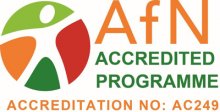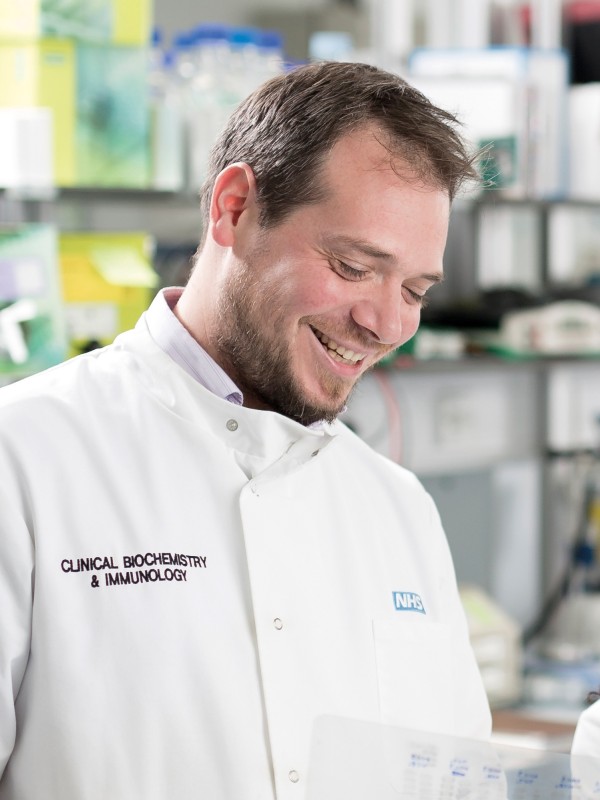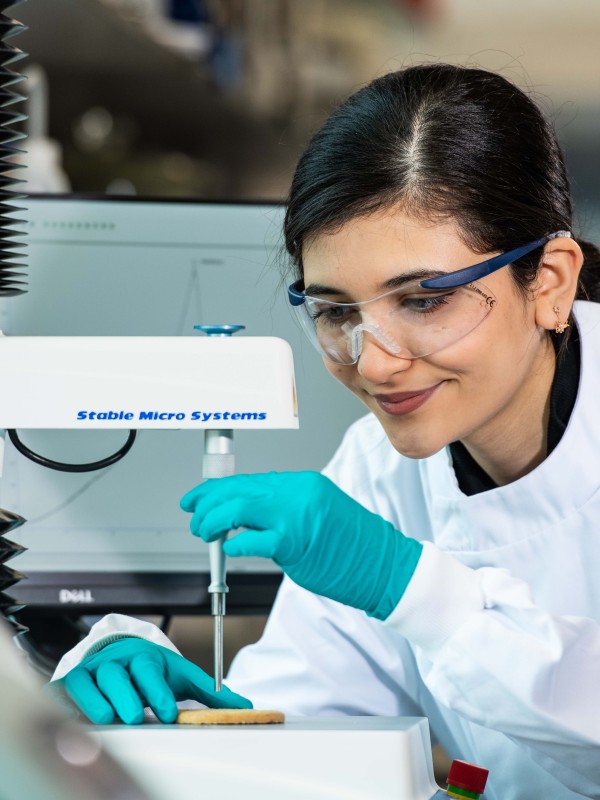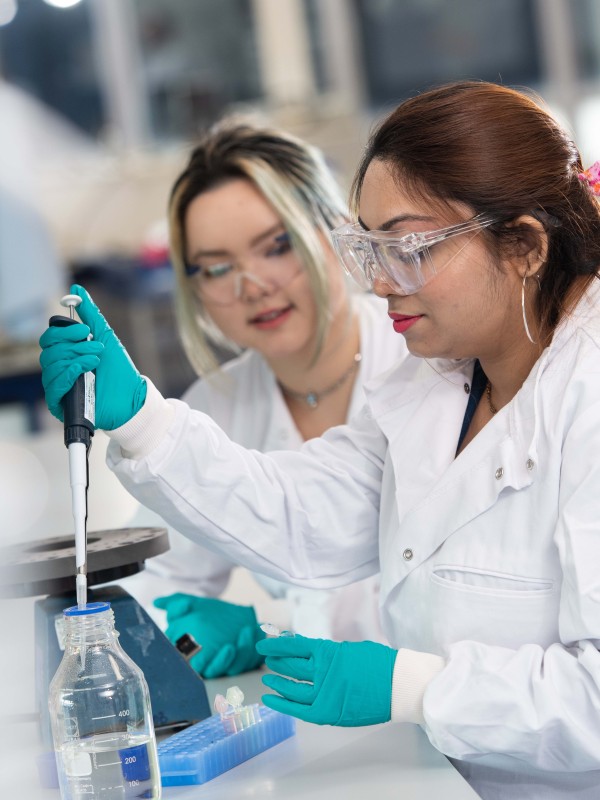
- Nutritional Medicine
MSc — 2025 entry Nutritional Medicine
Study on the only evidence-based nutritional medicine masters in Europe, which was designed specifically for those with a role in nutrition and health practice.
Why choose
this course?
- Gain a deep understanding of the complex relationships between nutrition and health, and the range and potential of nutritional management to postpone or treat disease.
- Learn from lecturers who have been awarded the Queen’s Anniversary Prize for Further and Higher Education in recognition of their research excellence in the field of food and nutrition.
- Get the academic requirements needed to register with the Association for Nutrition (AfN) to work as an associate nutritionist once you’ve graduated.
Statistics
100%
Of our biosciences masters graduates are in employment or further study (Graduate Outcomes 2024, HESA)
12th in the UK
Surrey is ranked 12th in the UK in the Complete University Guide 2025
Accreditation

What you will study
On this course, you’ll develop a critical and scholarly approach to theory, practice, literature and research findings.
You’ll study topics such as antioxidants, diet and behaviour, epidemiology, lipids, nutrition and exercise for health and sports performance, nutritional aspects of pregnancy, the nervous system and phytoprotectants.
You’ll also complete a research dissertation that will allow you to carry out experiments and projects on important topics in the field. We’ll match your interests with the expertise of our researchers, ensuring you get the best support.
Professional recognition
MSc - Association for Nutrition (AfN)
Accredited by the Association for Nutrition (AfN) for the purpose of eligibility for Direct Entry Registration at Associate Level with the UK Voluntary Register of Nutritionists (UKVRN).
International students travelling to the UK
Due to the module structure of this programme, we are unable to provide sponsorship on the Student Route. International students should make use of the Visitor Visa Route to attend the practical component of the programme. Further details can be found on our apply for a visa page.
Unfortunately, the University cannot guarantee that Visitor Visa applications will be successful, and a refusal may result in students being unable to successfully complete the programme.
This part-time course provides flexibility to complete modules, allowing you to fit your study around existing commitments.
Course length
This course can take between 2-5 years to complete. This is dependent on how many modules you select to study at a given time.
The structure of our programmes follows clear educational aims that are tailored to each programme. These are all outlined in the programme specifications which include further details such as the learning outcomes:
Modules
Modules listed are indicative, reflecting the information available at the time of publication. Modules are subject to teaching availability, student demand and/or class size caps.
The University operates a credit framework for all taught programmes based on a 15-credit tariff, meaning all modules are comprised of multiples of 15 credits, up to a maximum of 120 credits.
Course options
Semester 1
Compulsory
This module is designed to give students an understanding of the role of dietary minerals in health and disease. Students will understand the daily intake recommendations and requirements for several important dietary minerals. They will also examine the evidence base for the health effects of both deficiency and excess of dietary minerals. By taking this module, students will develop practical application of knowledge through understanding the main dietary sources and inhibitors of dietary minerals. They will also understand the issues around assessments of mineral/trace element status in individuals, including issues to consider when interpreting measurements. Finally, the module outlines how the current focus on sustainable diets may affect dietary mineral intake and status. The trace element dinner provides an opportunity to consolidate knowledge from the module.
View full module detailsOptional
To explain the role of diet, nutrition, and nutritional interventions that can affect the brain, nervous system and behaviour so students will have a fuller understanding of these very important issues. The importance of brain-microbiome interactions will also be covered now we recognise the importance of the microbiome to other nutrition and health issues. Students will have the experience of a “Brain” dinner where they will be exposed to foods important to the brain.
View full module detailsThe purpose of this module is to provide a conceptual understanding of the role of free-radicals, reactive oxygen and nitrogen species in health and disease and to develop an understanding of the biochemical and cellular mechanisms involved in this process. The module also examines a variety of phytoprotectants and their role in promoting health and preventing disease and the variety of mechanisms, through which they exert their effects. This module develops on some antioxidant concepts covered in Module 1 Principles of Nutritional Science (BMSM001). The module also helps support understanding in Module 4 Obesity, Diabetes and Easting Disorders (BMSM004) and Module 7 Nutrition in Aging (BMSM007).
View full module detailsThis module is designed to be clinically orientated with a practical focus. It will lead to an understanding of the aetiology, consequences and treatment nutritional approaches for patients with diabetes and clinical diseases such as eating disorders and renal disease. The module will also cover the assessment and management of patients with malnutrition, including various aspects of nutritional support.
View full module detailsSemester 2
Compulsory
This module will lead to an understanding of the rationale behind current approaches to care of patients in obesity and weight management. It also provides a detailed appreciation of dietary lipids, including their sources of origin, biochemistry, functions and essential roles in health. Building on this, the module will critically examine and evaluate evidence for the roles of specific dietary fatty acids in the prevention and management of disease.
View full module detailsCompletion of this module will enable students to understand and appreciate the changing nutritional needs and challenges across the lifespan, focusing on key developmental periods such as pregnancy, lactation, infancy and older age. They will learn about the substantial role of early life nutrition in later health and about the impact of ageing on a range of body systems, and how nutrition can mediate these effects. The module combines cutting edge science with practical applications and public health to allow students to develop their knowledge but also see how this might be applied in practice. Recent UK data will be used to conceptualize the problem and the populations of interest and we will discuss dietary recommendations for healthy populations as well as dietary prevention and management of associated diseases, such as iron deficiency and dementia. The module will signpost students to other modules with complementary content, e.g. obesity/ diabetes and CVD.
View full module detailsCore
This module provides an overview of the core and applied principles of nutritional epidemiology and public health nutrition for students and practitioners on the Nutritional Medicine MSc programme.
View full module detailsOptional
This module aims to give an overview of adverse reactions to foods with a focus on immune-mediated adverse reactions including IgE-mediated food allergy and coeliac disease
View full module detailsAs with other modules in this programme, this module gathers a range of internal and external speakers to provide specific insights into the role and application of nutrition to sport and exercise. As a foundation for this specific application of nutrition the module starts with a brief overview of exercise physiology and limits to performance, before covering key areas of nutrition in an exercising situation, both in terms of performance and in terms of health. Students’ knowledge and appraisal of evidence are developed and assessed by completing two short evidence-based essays. Students’ application of knowledge is developed using formative activities within the taught part of the modules, but also through undertaking a summative case study assignment.
View full module detailsAcross academic years
Core
To provide detailed knowledge of the application of nutrition expertise in medical practice across pathways for medicine, surgery, and general practice and private practice. This compulsory module is designed to cover key principles which will be required for all future modules and to build a cohort identity for the students who will be working independently until the next module.
View full module detailsThis module allows the student to engage in an in-depth major project in an area relevant for nutritional science in the 21st Century. Projects may involve direct data collection, analysis of pre-existing datasets or “big-data”, systematic reviews/meta-analysis or involve writing a research grant application to answer a pertinent nutritional question. Students may be attached to NHS units, to staff or research teams within the Department of Nutritional Sciences, but also in other areas in the wider University, including psychology. Students will be guided to undertake a project in an area of interest and allocated an appropriate University supervisor(s).
View full module detailsOptional modules for Unstructured (2-5 years) - FHEQ Level 7
For further information regarding programme structure and module selection, please refer to the course catalogue.
Teaching and learning
You’ll be taught by experts at the frontline of research and practice, ensuring everything you learn is up-to-date and relevant to employers.
You’ll also learn from lecturers who were awarded the Queen’s Anniversary Prize 2017-18 for Further and Higher Education, in recognition of their research excellence in the field of food and nutrition. These may include:
- Dr Sarah Bath, an expert in iodine in pregnancy
- Professor Margaret Rayman, an expert on the effects of selenium
- Professor Susan Lanham-New, an expert on nutritional aspects of bone health
- Dr Adam Collins, an expert on energy balance and body composition.
Your teaching will include face-to-face activities on campus and will be delivered through a combination of:
- Lectures
- Seminars
- Tutorials
- Group work (e.g. discussion groups)
- Online learning
- Bespoke module dinners.
Before you start each module, you’ll receive preliminary learning materials which are equivalent to up to 40 hours of independent study. This material will ensure you’re prepared with the correct background knowledge to begin your module.
After each module, you’ll be expected to continue studying the material covered. This includes additional reading of journal articles to reinforce and further your understanding.
Assessment
We use a variety of methods to assess you, including coursework; this could be based on essays, case studies, data analysis and presentations.
Check individual module information to see full details at a module level.
General course information
Contact hours
Contact hours can vary across our modules. Full details of the contact hours for each module are available from the University of Surrey's module catalogue. See the modules section for more information.
Timetable
Timetables for each module are normally available one month before a module begins.
Teaching is always on consecutive days (Monday – Friday). Details can be obtained from the Academic Hive. View our code of practice for the scheduling of teaching and assessment (PDF).
Location
This course is based at Stag Hill campus. Stag Hill is the University's main campus and where the majority of our courses are taught.
Modules take place on Manor Park or Stag Hill campuses, and some sessions may be online.
We offer careers information, advice and guidance to all students whilst studying with us, which is extended to our alumni for three years after leaving the University.
This course is accredited by the Association for Nutrition (AfN). This means you’ll be eligible to apply for direct entry into the UK Voluntary Register of Nutritionists to work as an associate nutritionist (ANutr) on successful completion of your studies. Once you’ve gained three years of post-degree professional experience, you’ll be eligible to apply for registered nutritionist status (RNutr). ANutr and RNutr nutritionists are the only evidence-based nutritionists recognised by NHS England, research and academia, the food industry, professional and elite sport, and most charities and non-government organisations in the UK and overseas.
100% of our biosciences masters graduates are in employment or further study (Graduate Outcomes 2024, HESA). Our alumni often start or continue careers as general practitioners, pharmacists and researchers in industry.
Many of our graduates go on to complete a PhD, investigating an area of personal interest.
Learn more about nutrition careers on the Association for Nutrition website.
Lily Soutter
Student - Nutritional Medicine MSc
"Once I had seen how powerful food could be on health and wellbeing, I wanted to learn more and help others with their own nutrition."


Andrea Cannas
Graduate - Nutritional Medicine MSc
"Four months after the publication of my first research paper, I've received a job opportunity as a Research Assistant on breast cancer epidemiological research at the Bank of Cyprus Oncology Centre."
UK qualifications
A minimum of a 2:1 UK honours degree in a medical degree (MBBS, MBChB), biology, biological sciences, pharmacy, dentistry, nutrition, nutritional science, human nutrition, dietetics, biochemistry, microbiology, medical microbiology, chemistry, biomedical science, natural sciences, pharmacology, physiotherapy, osteopathy, sport and exercise science, psychology (occasional route only), or a recognised equivalent international qualification.
Not accepted: Lower qualifications in nutritional therapy; nutritional therapy diploma from the Institute for Optimum Nutrition.
English language requirements
IELTS Academic: 6.5 overall with a minimum of 6.0 in each component.
These are the English language qualifications and levels that we can accept.
If you do not currently meet the level required for your programme, we offer intensive pre-sessional English language courses, designed to take you to the level of English ability and skill required for your studies here.
Selection process
Selection will be based upon the candidate’s application and references. Applications that do not meet the standard criteria are referred to the admissions tutor.
Scholarships and bursaries
Discover what scholarships and bursaries are available to support your studies.
Fees
Explore UKCISA’s website for more information if you are unsure whether you are a UK or overseas student. View the list of fees for all postgraduate courses.
September 2025 - Part-time - 5 years
- UK
- £1,300 per 15 credits
- Overseas
- £1,300 per 15 credits
- The fee shown above is per 15 credits for the 2024-25 academic year.
- The dissertation module is charged as a 45 credit module for fee purposes.
- The fees for 2024/25 apply to all students regardless of their study start date
- Please note that fees are subject to annual review and may increase each academic year.
Payment schedule
- Students with Tuition Fee Loan: the Student Loans Company pay fees in line with their schedule (students on an unstructured self-paced part-time course are not eligible for a Tuition Fee Loan).
- Students without a Tuition Fee Loan: pay their fees either in full at the beginning of the programme or in two instalments as follows:
- 50% payable 10 days after the invoice date (expected to be October/November of each academic year)
- 50% in January of the same academic year.
- Students on part-time programmes where fees are paid on a modular basis: cannot pay fees by instalment.
- Sponsored students: must provide us with valid sponsorship information that covers the period of study.
The exact date(s) will be on invoices.
Apply online
To apply online first select the course you'd like to apply for then log in.
Select your course
Choose the course option you wish to apply for.
Sign in
Create an account and sign into our application portal.
Please note that we may have to close applications before the stated deadline if we receive a high volume of suitable applications. We advise you to submit your application as soon as it is ready.
ApplyAdmissions information
Once you apply, you can expect to hear back from us within 14 days. This might be with a decision on your application or with a request for further information.
Our code of practice for postgraduate admissions policy explains how the Admissions team considers applications and admits students. Read our postgraduate applicant guidance for more information on applying.
About the University of Surrey
Need more information?
Contact our Admissions team or talk to a current University of Surrey student online.
Terms and conditions
When you accept an offer to study at the University of Surrey, you are agreeing to follow our policies and procedures, student regulations, and terms and conditions.
We provide these terms and conditions in two stages:
- First when we make an offer.
- Second when students accept their offer and register to study with us (registration terms and conditions will vary depending on your course and academic year).
View our generic registration terms and conditions (PDF) for the 2024/25 academic year, as a guide on what to expect.
Disclaimer
This online prospectus has been published in advance of the academic year to which it applies.
Whilst we have done everything possible to ensure this information is accurate, some changes may happen between publishing and the start of the course.
It is important to check this website for any updates before you apply for a course with us. Read our full disclaimer.










